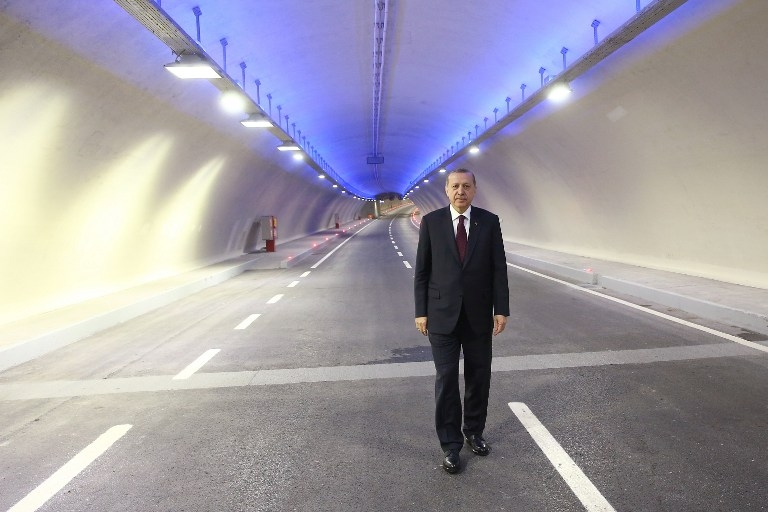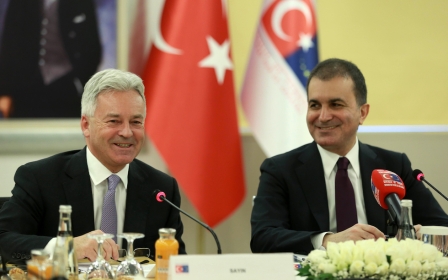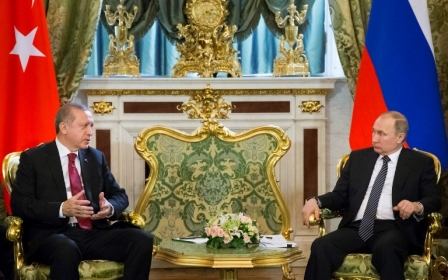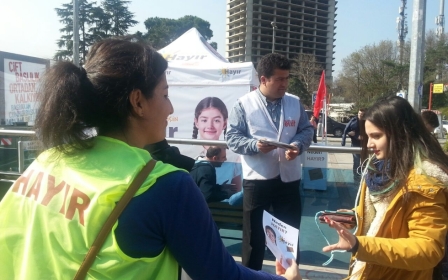Erdogan may win the referendum, but Turkey will lose

Turkey’s diplomatic clash with the EU shows no signs of letting up.
A German politician accused Turkey this week of "unacceptable" spying on dissidents on its soil. Meanwhile fresh after Ankara’s diplomatic bust-up with the Netherlands, Turkey’s President Recip Tayyip Erdogan continues to admonish Europe. He recently went as far as to threaten Europe that if his ministers are disrespected Europeans will be unable “to walk in the streets with peace and safety in any place in the world”.
Such statements, of course, angered European leaders who were still stunned by Erdogan’s tirades against the Netherlands, which according to the Turkish president is a “banana republic”, a “Nazi remnant,” and responsible for the Srebrenica massacre by Serbs against Bosnian Muslims in 1995.
Erdogan was vexed by the decision to deny entry to his ministers to campaign in the Netherlands. Germany, which also restricted access for Turkish ministers, as did other European nations, was accused by Erdogan of engaging in “Nazi practices”.
All's fair in Erdogan's Turkey
Such statements might appear harsh to the ears of a non-Turkish observer. However, in Turkey such behaviour by Erdogan and his associates is common practice. For them, politics is a no-holds-barred battle for power where nothing is considered below the belt.
Erdogan and his political supporters have said that those who vote against are siding with last July's coup plotters
For example, during Erdogan’s 2014 presidential campaign, his team maliciously claimed that his opponent, Ekmeleddin Ihsanoglu, did not know the Turkish national anthem, avoided compulsory military service and wanted to prevent Turks from reading the Quran in Arabic. It did not matter that all of these accusations were entirely false.
Ahead of next month’s referendum, which if successful, would grant him a monopoly of political power, Erdogan and his political supporters have said that those who vote against are siding with last July’s coup plotters, sound like terrorists, and, unless Erdogan is given his greater powers, terrorism will continue.
Let’s also not forget that since last July’s attempted coup, blamed on the Fetullah Gulen Movement, over 140,000 Turks have been either arrested or suspended from their jobs. There has been little care to differentiate the innocent from the guilty.
Meanwhile, leaders of the Kurdish-oriented Peoples’ Democratic Party (HDP), critics of Erdogan from the left flank, were arrested and still remain in prison on trumped up and politically motivated charges of terrorism. All’s fair in Erdogan’s Turkey.
Anti-EU discourse
Campaigning ahead of the referendum is taking place while the country remains under a state of emergency, allowing the government to ban public meetings, rallies and protests, and even restrict access to public places.
Erdogan and his government have a virtual monopoly over campaigning
In other words, the ability of Erdogan’s opponents to mobilise is limited. Meanwhile, Erdogan and his government have a virtual monopoly over campaigning. Towns and cities are brimming with "Yes" campaign sign posters, signs and adverts, while the print and broadcast media air government publicity.
But such propaganda has had little impact. Instead, the increase in support for Erdogan’s 'Yes' campaign was a result of his anti-European discourse. So, of course, Erdogan does not care about European sensitivities. Nor does he care that by drawing parallels to genocidal campaigns he denigrates the horrors of the Nazi and Serbian atrocities.
All that Erdogan currently cares about is his country’s forthcoming referendum. However, his actions may backfire.
More bark than bite
Turkey has little leverage on the Netherlands, Germany or any other European country. Turkey’s threat to scrap the refugee deal is more bark than bite. First, if Turkey were to tear up the agreement, it would lose much needed revenue promised by Europe.
As Turkey’s largest trading partner, Ankara needs the EU now more than ever
Second, it is unlikely that Europe would be inundated with hordes of migrants. Some wish to stay until it is safe to return to Syria. Also, Europe has worked to increase its security along Turkey’s borders with Bulgaria and Greece as well as the Mediterranean. If some migrants get through, it is doubtful they will get very far.
As Turkey’s largest trading partner, Ankara needs the EU now more than ever. Almost 55 percent of exports from Turkey go to Europe. What is more, almost $8bn of Turkey’s $12bn dollars of foreign direct investment comes from Europe.
Turkey is also desperate to welcome back European visitors to fill up its empty hotels on the verge of bankruptcy. All this is while Turkey’s economy is on the ropes with growth forecasts looking tepid. There has been a 1.9 percent rise in unemployment (now at 12.7 percent), the credit agency Moody’s recently cut Turkey’s rating outlook to negative and the lira continues to devalue against the dollar, euro and other major currencies.
Europe is fed up and is starting to react. Turkey’s military is dependent on German arms so Berlin’s decision to veto arms exports to Turkey on 21 March was quite a setback. In the soon to leave UK, a parliamentary select committee warned that closer ties with Erdogan could harm Britain’s international reputation and that Ankara is using last summer’s attempted coup to suppress human rights.
If Turkey continues on its current trajectory, European retaliation is inevitable. However, in all likelihood, Erdogan will continue to play the anti-EU card. This might win him a referendum, but Turkey as a country stands to lose.
- Dr Simon A Waldman is Visiting Research Fellow at King's College London. Emre Caliskan is reading for a DPhil in International Relations at the University of Oxford. They are the authors of the recently published, “The New Turkey and Its Discontents” (Hurst and Co: 2016). Follow them on Twitter @simonwaldman1 and @calemre.
The views expressed in this article belong to the author and do not necessarily reflect the editorial policy of Middle East Eye.
Photo: Turkish President Recep Tayyip Erdogan posing in Istanbul in December 2016 during the opening cerenomy of the Avrasya (Eurasia) Tunnel, the first ever road tunnel underneath the Bosphorus Strait in Istanbul from Europe to Asia and the latest project in the Erdogan's plan of transforming Turkey's infrastructure (AFP/Turkish Presidential Office)
New MEE newsletter: Jerusalem Dispatch
Sign up to get the latest insights and analysis on Israel-Palestine, alongside Turkey Unpacked and other MEE newsletters
Middle East Eye delivers independent and unrivalled coverage and analysis of the Middle East, North Africa and beyond. To learn more about republishing this content and the associated fees, please fill out this form. More about MEE can be found here.




